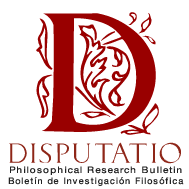Thomas E. Hill, Jr.
University of North Carolina at Chapel Hill, USA | thill@email.unc.edu
Received: 3-October-2019 | Accepted: 21-December-2019 | Published: 31-December-2019
Disputatio [Dec. 2019], Vol. 8, No. 11, pp. 505–529 | DOI: 10.5281/zenodo.3596159
Article | [SP] | Full Text | Statistics | Copyright Notice [sp] | Vol. 8 No. 11
How to cite this article:
Hill, Thomas (2019). «Kantian Ethics and Utopian Thinking». Disputatio. Philosophical Research Bulletin 8, no. 11: pp. 505–529.
Abstract | Is Kantian Ethics guilty of utopian thinking? First, potentially good and bad uses of utopian ideals are distinguished, then an apparent path is traced from Rousseau’s unworkable political ideal to Kant’s ethical ideal. Three versions of Kant’s Categorical Imperative (and their counter–parts in common moral discourse) are examined briefly for the ways that they may raise the suspicion that they manifest or encourage bad utopian thinking. In each case Kantians have available responses to counter the suspicion, but special attention is directed to the version that says “Act on the maxims of a universally law–giving member of a kingdom of ends.” Interpretations vary, but here primary focus is on one contemporary reconstruction and development of this central idea. Several objections suggest that this idea encourages bad utopian thinking are briefly addressed: that we cannot count on everyone to follow ideal rules, that even conscientious people disagree in their moral judgments, and that theories that allow exceptions to familiar moral rules create a “slippery slope” to moral chaos.
Keywords | Kantian Ethics · Categorical Imperative · Exceptions · Utopias · Utopian Thinking.
![]()
Ética kantiana y pensamiento utópico
Resumen | La ética de Kant ¿es culpable de pensamiento utópico? Primero se hace una distinción entre los usos potencialmente buenos y malos de los ideales utópicos. Luego se traza lo que parece ser una ruta del ideal político inviable al ideal ético de Kant. Se examinan brevemente tres versiones del imperativo categórico (y sus contrapartes en el discurso moral común) en cuanto a las maneras en que podrían hacer surgir la sospecha de que podrían manifestar o inspirar un pensar utópico malo. Un kantiano dispone en cada uno de estos casos de respuestas para argumentar contra esta sospecha. Se presta atención particular, sin embargo, a la versión que dice «actúa sobre la máxima de un legislador universal de un reino de fines». Las interpretaciones varían, pero el enfoque principal se pone aquí sobre una reconstrucción y un desarrollo contemporáneos de esta idea central. Se tratan brevemente varias objeciones que sugieren que esta idea inspira un pensar utópico malo: que no podemos confiar de que todo el mundo sigue reglas ideales, que hasta gente escrupulosa discrepa en sus juicios morales y que las teorías que dan lugar a excepciones de reglas morales conocidas generan un caos moral de «situación resbalos».
Palabras clave | Ética kantiana · Imperativo categórico · Excepciones · Utopías · Pensar utópico.
References
Boxill, Bernard (ed.) (2001). Race and Racism. Oxford: Oxford University Press.
Donagan, Alan (1977). The Theory of Morality. Chicago: University of Chicago Press.
Engels, Friedrich (1878). Landmarks of Scientific Socialism: Anti–Duhring. Translated by Austin Lewis. Chicago: Charles H. Kerr & Company, 1907.
Herman, Barbara (1993). The Practice of Moral Judgment. Cambridge, Massachusetts and London: Harvard University Press.
Hill, Thomas (1992). Dignity and Practical Reason in Kant’s Moral Theory. Ithaca: Cornell University Press.
Hill, Thomas (2000). Respect, Pluralism, and Justice: Kantian Perspectives. Oxford: Oxford University Press.
Hill, Thomas (2002). Human Welfare and Moral Worth: Kantian Perspectives. Oxford: Oxford University Press.
Hill, Thomas (2003). Treating Criminals as Ends in Themselves. The Annual Review of Law and Ethics Band 11: 17–36.
Hill, Thomas (2006). Lindlay Lecture: The Importance of Moral Rules and Principles. Lawrence: University of Kansas Press.
Hill, Thomas (2008). Moral Construction as a Task: Sources and Limits. Social Philosophy and Policy 25 (1): 214–236.
Hill, Thomas (2016). Human Dignity and Tragic Choices. Proceedings and Addresses of the American Philosophical Association 89: 74–94.
Kant, Immanuel (1785). Groundwork for the Metaphysics of Morals. Translated by Arnuf Zweig and edited by Thomas E. Hill, Jr. and Arnulf Zweig. Oxford: Oxford University Press, 2002.
Kant, Immanuel (1788). Critique of Practical Reason. Translated by Mary Gregor. Cambridge: Cambridge University Press, 1997.
Kant, Immanuel (1793–4). Religion within the Boundaries of Mere Reason. Translated and edited by Allen Wood and G. Di Giovanni. Cambridge: Cambridge University Press, 1998.
Kant, Immanuel (1795). Toward Perpetual Peace. In Toward Perpetual Peace and Other Writings on Politics, Peace, and History, translated by David L. Colclasure and edited by Pauline Kleingeld. New Haven: Yale University Press, 2006.
Kant, Immanuel (1797). On a supposed right to tell a lie from philanthropy. In Practical Philosophy, translated and edited by Mary Gregor. Cambridge: Cambridge University Press, 1996, pp. 605–6.
Kant, Immanuel (1797–8). The Metaphysics of Morals. Translated and edited by Mary Gregor. Cambridge: Cambridge University Press, 1996.
Marx, Karl (1844). Introduction to Critique of Hegel’s Philosophy of Right. Deutsch–Französische Jahrbucher. Paris.
More, Thomas (1516). Utopia. Translated and edited by Paul Turner. London: Penguin Books, 2003.
O’Neill, Onora (1989). Constructions of Reason: Exploring Kant’s Practical Philosophy. Cambridge: Cambridge University Press.
Plato. The Republic. Translated by G.M.A. Grube and revised by C.D.C. Reeve. Indianapolis: Hackett Publishing Company, 1992.
Rawls, John (1971). A Theory of Justice. Cambridge, Massachusetts: Harvard University Press.
Rawls, John (1996). Political Liberalism. New York: Columbia University Press.
Rawls, John (2001). The Law of Peoples. Cambridge, Massachusetts: Harvard University Press.
Rousseau, Jean–Jacques (1755). Discourse on the Origin of Inequality. Translated by Franklin Philip. Oxford: Oxford University Press, 1994.
Rousseau, Jean–Jacques (1762). The Social Contract. Translated by Maurice Cranston. London: Penguin Books, 1968.
© The author(s) 2019. This work, published by Disputatio [www.disputatio.eu], is an Open Access article distributed under the terms of the Creative Commons License [BY–NC–ND]. The copy, distribution and public communication of this work will be according to the copyright notice. For inquiries and permissions, please email: boletin@disputatio.eu.

